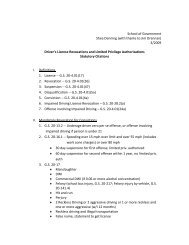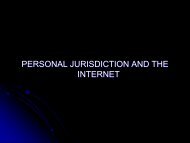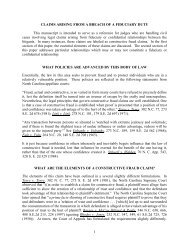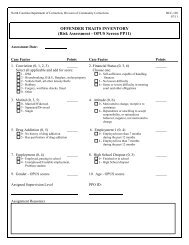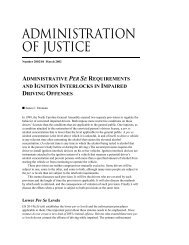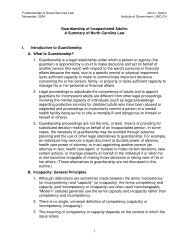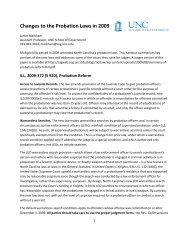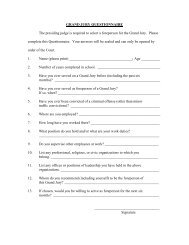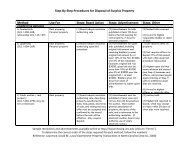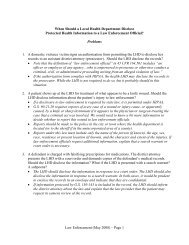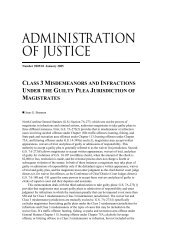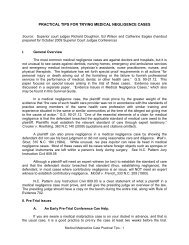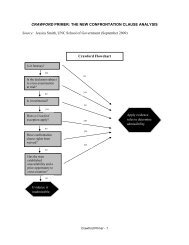Handout 1 - School of Government - University of North Carolina at ...
Handout 1 - School of Government - University of North Carolina at ...
Handout 1 - School of Government - University of North Carolina at ...
Create successful ePaper yourself
Turn your PDF publications into a flip-book with our unique Google optimized e-Paper software.
Social Services Attorneys’ Winter/Spring Conference<br />
Chapel Hill, NC<br />
February 26 - 27, 2009<br />
CASE UPDATE<br />
Cases Filed from July 1, 2008, through February 17, 2009<br />
Janet Mason<br />
<strong>School</strong> <strong>of</strong> <strong>Government</strong><br />
The <strong>University</strong> <strong>of</strong> <strong>North</strong> <strong>Carolina</strong> <strong>at</strong> Chapel Hill<br />
(919) 966-4246<br />
mason@sog.unc.edu
ABUSE, NEGLECT, DEPENDENCY<br />
Jurisdiction<br />
• When a custody order had been entered in another st<strong>at</strong>e, a N.C. court had jurisdiction to enter a<br />
nonsecure custody order, but erred in proceeding to adjudic<strong>at</strong>ion when the record failed to show th<strong>at</strong><br />
N.C. had jurisdiction under the UCCJEA to modify another st<strong>at</strong>e’s order.<br />
In re J.W.S., ___ N.C. App. ___, 669 S.E.2d 850 (12/16/08).<br />
http://www.aoc.st<strong>at</strong>e.nc.us/www/public/coa/opinions/2008/080576-1.htm<br />
Facts: In 2000, a Family Court in New York granted the child’s mother temporary custody “pending the<br />
criminal court action,” after which, it said, either party could petition for custody. In 2006, respondent<br />
f<strong>at</strong>her filed a divorce action in N.C. and signed a one-year apartment lease. A couple who lived with him<br />
and the child reported th<strong>at</strong> respondent had assaulted the child. DSS filed a petition and obtained<br />
nonsecure custody. (Two additional petitions were filed on l<strong>at</strong>er d<strong>at</strong>es.) The child remained in nonsecure<br />
custody, and the court denied respondent’s motions to dismiss for lack <strong>of</strong> jurisdiction and failure to st<strong>at</strong>e a<br />
claim, ruling th<strong>at</strong> the court had properly exercised temporary emergency jurisdiction under the UCCJEA.<br />
After a hearing, in April 2007 the court adjudic<strong>at</strong>ed the child to be neglected and dependent. The order<br />
st<strong>at</strong>ed th<strong>at</strong> New York had opted not to exercise continuing jurisdiction and th<strong>at</strong> the st<strong>at</strong>es had agreed th<strong>at</strong><br />
N.C. was the most appropri<strong>at</strong>e forum to exercise jurisdiction. After a combined dispositional and<br />
permanency planning hearing, in May 2007 the court changed the permanent plan to adoption. In August<br />
DSS filed a motion to termin<strong>at</strong>e both parents’ rights. In December 2007 respondent filed a motion under<br />
G.S. 1A-1, Rule 60(b), asking the court to set aside the April adjudic<strong>at</strong>ion order, asserting th<strong>at</strong> the trial<br />
court lacked subject m<strong>at</strong>ter jurisdiction under the UCCJEA. The court denied the motion, and respondent<br />
appealed.<br />
Note: The facts were substantially more complic<strong>at</strong>ed, because respondent also sought relief from a<br />
federal court and from st<strong>at</strong>e courts in Texas and Virginia during the pendency <strong>of</strong> the m<strong>at</strong>ter in N.C.<br />
Held: Reversed.<br />
1. The trial properly exercised temporary emergency jurisdiction under G.S. 50A-204.<br />
2. Because a custody order had been entered in New York, the trial court could not proceed to<br />
adjudic<strong>at</strong>ion without determining th<strong>at</strong> it had jurisdiction to modify another st<strong>at</strong>e’s order. The record<br />
failed to show th<strong>at</strong> N.C. had jurisdiction because it did not establish<br />
a. th<strong>at</strong> New York had determined th<strong>at</strong> it did not have exclusive continuing jurisdiction, or<br />
b. th<strong>at</strong> New York had relinquished jurisdiction to N.C. after finding th<strong>at</strong> N.C. was a more appropri<strong>at</strong>e<br />
forum, or<br />
c. th<strong>at</strong> either New York or <strong>North</strong> <strong>Carolina</strong> had determined th<strong>at</strong> no party still resided in New York.<br />
Guardian ad Litem for Parent; Visit<strong>at</strong>ion<br />
• Where evidence and findings indic<strong>at</strong>ed a reasonable basis to believe respondent parent was<br />
incompetent or had diminished capacity, trial court’s failure to conduct a hearing to determine<br />
whether respondent needed a guardian ad litem was an abuse <strong>of</strong> discretion.<br />
• Court may not deleg<strong>at</strong>e to DSS discretion to determine parents’ visit<strong>at</strong>ion rights.<br />
In re M.H.B., ___ N.C. App. ___, 664 S.E.2d 583 (8/19/08).<br />
http://www.aoc.st<strong>at</strong>e.nc.us/www/public/coa/opinions/2008/080337-1.htm<br />
Facts: In a case in which the child was adjudic<strong>at</strong>ed abused and neglected, the court made findings<br />
1. th<strong>at</strong> respondent st<strong>at</strong>ed he suffered posttraum<strong>at</strong>ic stress disorder, was manic depressive and bipolar,<br />
was prescribed lithium but did not like its side effects, and self-medic<strong>at</strong>ed with marijuana.<br />
3
2. th<strong>at</strong> respondent received mental health tre<strong>at</strong>ment and th<strong>at</strong> while testifying he was weeping, crying,<br />
confounded, agit<strong>at</strong>ed, st<strong>at</strong>ed he wished someone would take his life, and st<strong>at</strong>ed th<strong>at</strong> he did not know<br />
why he was present <strong>at</strong> the adjudic<strong>at</strong>ory hearing.<br />
3. th<strong>at</strong> respondent thre<strong>at</strong>ened suicide after the petition was filed.<br />
4. th<strong>at</strong> respondent was mentally and emotionally unstable.<br />
The court ordered respondent to have a psychological evalu<strong>at</strong>ion, suspended visit<strong>at</strong>ion until DSS had the<br />
results <strong>of</strong> the evalu<strong>at</strong>ion, and authorized DSS then to determine wh<strong>at</strong> supervised visit<strong>at</strong>ion respondent<br />
would have.<br />
Held: Reversed and remanded.<br />
1. Although appointment <strong>of</strong> a guardian ad litem for an adult parent under G.S. 7B-602 is in the court’s<br />
discretion, given the evidence and findings rel<strong>at</strong>ing to respondent’s condition, the trial court abused<br />
its discretion by not conducting a hearing to determine whether a guardian ad litem for respondent<br />
should be appointed pursuant to G.S. 1A-1, Rule 17.<br />
2. The court erred in deleg<strong>at</strong>ing to DSS decisions regarding respondent’s visit<strong>at</strong>ion rights.<br />
Adjudic<strong>at</strong>ory Evidence<br />
• The rape shield law, G.S. 8C-1, Rule 412, can apply in civil cases to render most evidence <strong>of</strong> a<br />
victim’s sexual history inadmissible.<br />
• Evidence <strong>of</strong> a false alleg<strong>at</strong>ion is not excluded by Rule 412, which addresses only sexual activity.<br />
• Rule 12 does not preclude introduction <strong>of</strong> a victim’s inconsistent st<strong>at</strong>ements for impeachment.<br />
In re K.W., ___ N.C. App. ___, 666 S.E.2d 490 (9/16/08).<br />
http://www.aoc.st<strong>at</strong>e.nc.us/www/public/coa/opinions/2008/080535-1.htm<br />
Facts: The 13-year-old juvenile reported to a school counselor th<strong>at</strong> her f<strong>at</strong>her had been raping her for the<br />
past year. After the f<strong>at</strong>her viol<strong>at</strong>ed a protection plan by returning to the home, DSS filed a petition and<br />
obtained nonsecure custody. Based on the juvenile’s testimony and testimony by a doctor, the court<br />
adjudic<strong>at</strong>ed the juvenile to be abused, neglected, and dependent. On appeal, respondent f<strong>at</strong>her argued th<strong>at</strong><br />
the trial court erred by excluding from evidence a police report filed by the juvenile’s mother five years<br />
earlier, which said “sexual assault,” and on which an <strong>of</strong>ficer had written th<strong>at</strong> there was doubt as to<br />
whether the juvenile was telling the truth. The report included no other inform<strong>at</strong>ion and had become<br />
inactive. Respondent also asserted error based on the court’s exclusion from evidence <strong>of</strong> the juvenile’s<br />
Myspace website, which included provoc<strong>at</strong>ive pictures <strong>of</strong> the juvenile and indic<strong>at</strong>ed th<strong>at</strong> she had “had<br />
sex,” which contradicted her st<strong>at</strong>ements to police and her testimony.<br />
Held: Affirmed.<br />
1. Although G.S. 8C-1, Rule 412, is written with reference to criminal proceedings, it can be applied in<br />
a civil case to exclude evidence <strong>of</strong> a victim’s sexual conduct th<strong>at</strong> does not fall within an exception to<br />
the rule.<br />
2. The five-year-old police report did not involve sexual activity and should not have been excluded<br />
based on Rule 412, which does not apply to false alleg<strong>at</strong>ions. However, the report was properly<br />
excluded because it had no prob<strong>at</strong>ive value – it included no specific inform<strong>at</strong>ion, did not indic<strong>at</strong>e the<br />
n<strong>at</strong>ure <strong>of</strong> the alleged assault, and did not indic<strong>at</strong>e who had doubt about the then 8-year-old child’s<br />
veracity.<br />
3. Evidence <strong>of</strong> the Myspace page should have been admitted for impeachment purposes, but not as<br />
substantive evidence th<strong>at</strong> someone else caused the physical trauma to the juvenile. Failure to allow it<br />
into evidence was harmless, however, because respondent did not show th<strong>at</strong> the outcome would have<br />
been different if it had been admitted.<br />
4. In addition to abuse, the evidence supported adjudic<strong>at</strong>ions <strong>of</strong> neglect, because the home was an<br />
injurious environment, and dependency, because the parents refused to abide by the safety plan.<br />
4
Failure to Enter Timely Order<br />
• Appropri<strong>at</strong>e remedy for trial court’s failure to enter a timely order is mandamus.<br />
In re T.H.T., 362 N.C. 446, 665 S.E.2d 54 (8/27/08).<br />
http://www.aoc.st<strong>at</strong>e.nc.us/www/public/sc/opinions/2008/469-07-1.htm<br />
Facts: The trial court completed an adjudic<strong>at</strong>ion and disposition hearing on July 26, 2006 – adjudic<strong>at</strong>ing<br />
the child to be abused and neglected, awarding custody to the f<strong>at</strong>her, and granting the mother<br />
unsupervised visit<strong>at</strong>ion. No written order was entered until November 3, 2006, and there was no hearing<br />
pursuant to G.S. 7B-807 to determine the reason for delay in entry <strong>of</strong> the order. The mother appealed, and<br />
the court <strong>of</strong> appeals affirmed, with one judge dissenting on the basis th<strong>at</strong> the delay prejudiced the mother<br />
and required reversal.<br />
Held: Modified and affirmed.<br />
1. The Supreme Court held th<strong>at</strong> “when delayed entry <strong>of</strong> an otherwise proper order is the sole purported<br />
ground for appeal, a new hearing is not the proper remedy. Instead, a party’s remedy lies in<br />
mandamus,” an extraordinary court order mand<strong>at</strong>ing the performance <strong>of</strong> a clear <strong>of</strong>ficial duty imposed<br />
by law.<br />
2. In describing the remedy <strong>of</strong> mandamus, the court specified these required elements:<br />
a. Party seeking relief must show a clear legal right to the act requested.<br />
b. Defendant must have a clear legal duty to perform the act.<br />
c. The duty must rel<strong>at</strong>e to a ministerial act, not an act requiring the exercise <strong>of</strong> discretion.<br />
(Mandamus may be used to compel an <strong>of</strong>ficial to exercise his or her discretion, but not to direct<br />
wh<strong>at</strong> the result should be.)<br />
d. The <strong>of</strong>ficial must have neglected or refused to perform the act.<br />
e. There must not be an altern<strong>at</strong>ive legally adequ<strong>at</strong>e remedy.<br />
Authority to Modify Delinquency Disposition<br />
• In a delinquency case, trial court did not err in changing disposition from residential tre<strong>at</strong>ment to<br />
commitment to youth development center after finding th<strong>at</strong> funding for residential tre<strong>at</strong>ment was no<br />
longer available.<br />
In re D.G., ___ N.C. App. ___, 663 S.E.2d 458 (8/5/08) (appeal pending).<br />
http://www.aoc.st<strong>at</strong>e.nc.us/www/public/coa/opinions/2008/070402-1.htm<br />
Facts: The juvenile was adjudic<strong>at</strong>ed delinquent after admitting a first degree sex <strong>of</strong>fense based on having<br />
anal intercourse with a five-year-old child. Both DSS, which apparently had custody <strong>of</strong> the juvenile, and<br />
mental health recommended residential tre<strong>at</strong>ment. DSS expressed concern about funding for the<br />
placement because the juvenile was an illegal alien. The court counselor assured the court th<strong>at</strong> st<strong>at</strong>e funds<br />
were available. The court ordered placement in a residential sex <strong>of</strong>fender tre<strong>at</strong>ment facility as a Level 2<br />
disposition. Five months l<strong>at</strong>er a motion for review was filed asserting th<strong>at</strong> funding for the placement was<br />
no longer available and asking th<strong>at</strong> the disposition be modified, and the juvenile filed a motion asking the<br />
court to compel the st<strong>at</strong>e to provide him with sex <strong>of</strong>fender tre<strong>at</strong>ment. Evidence included a letter from the<br />
<strong>at</strong>torney for mental health st<strong>at</strong>ing th<strong>at</strong> the juvenile was not a qualified alien and th<strong>at</strong> mental health could<br />
not provide funding for custodial sex <strong>of</strong>fender tre<strong>at</strong>ment. The letter was based on an opinion from the<br />
Office <strong>of</strong> the N.C. Attorney General. The trial court found th<strong>at</strong> under st<strong>at</strong>e and federal law funding for the<br />
placement was no longer available. The court denied the juvenile’s motion to compel and amended the<br />
disposition to commit the juvenile to a youth development center for an indefinite time not to exceed his<br />
nineteenth birthday. The juvenile appealed.<br />
Holding: Affirmed.<br />
5
1. The trial court’s finding th<strong>at</strong> funding was not available was supported by competent evidence and<br />
therefore conclusive on appeal. Evidence included testimony from mental health and DSS personnel<br />
th<strong>at</strong> they had explored all avenues <strong>of</strong> funding and th<strong>at</strong> funding was not available due to federal law.<br />
2. The court properly ruled th<strong>at</strong> it could not compel the provision <strong>of</strong> residential tre<strong>at</strong>ment in viol<strong>at</strong>ion <strong>of</strong><br />
federal law.<br />
3. The facts constituted a change <strong>of</strong> circumstances and justified modific<strong>at</strong>ion <strong>of</strong> the disposition under<br />
G.S. 7B-2600.<br />
Dissent: Judge Wynn dissented on the basis th<strong>at</strong><br />
• the trial court had not been presented any clear administr<strong>at</strong>ive or st<strong>at</strong>utory law regarding the funding<br />
question;<br />
• the alleg<strong>at</strong>ions and arguments <strong>of</strong> mental health and DSS did not constitute competent evidence;<br />
• the “opinion” from the Attorney General’s Office actually was just an advisory letter th<strong>at</strong> had no legal<br />
force or effect;<br />
• the court’s “finding” about lack <strong>of</strong> funding was actually a conclusion <strong>of</strong> law th<strong>at</strong> was not supported by<br />
the evidence or findings;<br />
• there had not been a legal determin<strong>at</strong>ion th<strong>at</strong> sexual <strong>of</strong>fender tre<strong>at</strong>ment is an impermissible “public<br />
benefit” within the meaning <strong>of</strong> the relevant federal law.<br />
Appealability <strong>of</strong> Order<br />
• A nonsecure custody order is not an appealable order.<br />
• DSS had no right to appeal denial <strong>of</strong> its motion seeking review <strong>of</strong> an earlier nonsecure custody order<br />
th<strong>at</strong> directed DSS to make foster care board payments to kinship care providers.<br />
In re A.T., ___ N.C. App. ___, 662 S.E.2d 917 (7/15/08).<br />
http://www.aoc.st<strong>at</strong>e.nc.us/www/public/coa/opinions/2008/080223-1.htm<br />
Facts:<br />
3/06 DSS substanti<strong>at</strong>ed neglect and child was placed voluntarily in kinship care<br />
7/07 DSS filed petition alleging child was neglected; court held nonsecure custody hearing<br />
9/07 – nonsecure custody order entered, leaving custody with DSS and ordering DSS to pay foster<br />
care board r<strong>at</strong>e to the kinship care providers, effective 3/06<br />
– adjudic<strong>at</strong>ion and disposition orders entered, continuing requirement th<strong>at</strong> DSS pay foster<br />
care board r<strong>at</strong>e to care providers<br />
10/07 – after a review hearing, court ordered th<strong>at</strong> custody remain with DSS<br />
– DSS filed motion asking court to review the foster care board r<strong>at</strong>e payment provision in the<br />
nonsecure custody order, arguing th<strong>at</strong> it improperly ordered payment from 3/06, when<br />
children had been in DSS custody only since 7/07<br />
After a hearing the trial court denied DSS’s motion, and DSS appealed.<br />
Held: Appeal dismissed.<br />
1. DSS had no right to appeal the earlier nonsecure custody order or the order denying its motion for<br />
review <strong>of</strong> th<strong>at</strong> order.<br />
2. Nonsecure custody orders are excluded from the list <strong>of</strong> appealable orders in G.S. 7B-1001, and the<br />
order denying DSS’s motion was neither a final order nor an order finding an absence <strong>of</strong> jurisdiction,<br />
where the court did not rule th<strong>at</strong> it lacked subject m<strong>at</strong>ter jurisdiction but only found as a fact th<strong>at</strong> it<br />
did not have jurisdiction during a portion <strong>of</strong> the time for which it had ordered payment <strong>of</strong> the foster<br />
care board r<strong>at</strong>e.<br />
3. The court <strong>of</strong> appeals did not consider the merits <strong>of</strong> any claim th<strong>at</strong> the order requiring DSS to pay the<br />
foster care board r<strong>at</strong>e or to pay it for a particular period <strong>of</strong> time was improper.<br />
6
Issuance <strong>of</strong> Summons to Child<br />
TERMINATION OF PARENTAL RIGHTS<br />
1. Subject m<strong>at</strong>ter jurisdiction <strong>at</strong>taches when a summons is issued.<br />
2. Defects or irregularities in the summons or in service <strong>of</strong> process rel<strong>at</strong>e to personal, not subject<br />
m<strong>at</strong>ter, jurisdiction and can be waived.<br />
In re J.T., ___ N.C. ___, ___ S.E.2d ___ (2/6/09), reversing In re J.T., ___ N.C. App. ___, 657 S.E.2d<br />
692 (2008).<br />
http://www.aoc.st<strong>at</strong>e.nc.us/www/public/sc/opinions/2009/pdf/155-08-1.pdf<br />
Facts: In an action to termin<strong>at</strong>e parental rights, a summons was issued, but it did not name the child as a<br />
respondent and the summons was not served on the child’s guardian ad litem or <strong>at</strong>torney advoc<strong>at</strong>e. Both<br />
the GAL and <strong>at</strong>torney advoc<strong>at</strong>e particip<strong>at</strong>ed fully in the hearing, however, without raising any objection<br />
to the summons or service <strong>of</strong> process. The court <strong>of</strong> appeals reversed the order termin<strong>at</strong>ing parental rights,<br />
holding th<strong>at</strong> the failure to name the child as a respondent in the summons deprived the trial court <strong>of</strong><br />
subject m<strong>at</strong>ter jurisdiction.<br />
Held: Reversed.<br />
The Supreme Court held th<strong>at</strong><br />
1. the trial court obtained subject m<strong>at</strong>ter jurisdiction when a summons was issued, and any problem with<br />
the summons or service <strong>of</strong> process rel<strong>at</strong>ed only to personal jurisdiction;<br />
2. the <strong>at</strong>torney advoc<strong>at</strong>e and GAL waived any issue with respect to defects or irregularities in process or<br />
service <strong>of</strong> process by particip<strong>at</strong>ing in the proceeding.<br />
On 2/6/09 the Supreme Court also granted DSS’s petition for discretionary review in In re I.D.G., ___<br />
N.C. App. ___, 655 S.E.2d 858 (2008), for the limited purpose <strong>of</strong> remanding to the court <strong>of</strong> appeals for<br />
reconsider<strong>at</strong>ion in light <strong>of</strong> J.T. (above). (Court <strong>of</strong> appeals had held th<strong>at</strong> failure to issue summons to the<br />
child when a petition to termin<strong>at</strong>e parental rights was filed deprived trial court <strong>of</strong> subject m<strong>at</strong>ter<br />
jurisdiction.)<br />
The Supreme Court’s holding in J.T. would affect the court’s reasoning, but not its conclusion, in the<br />
following recent cases:<br />
• In re S.L.T., ___ N.C. App. ___, 670 S.E.2d 922 (1/20/09) (holding th<strong>at</strong> juvenile need not be named<br />
as respondent if the juvenile is named in the caption <strong>of</strong> the summons and the guardian ad litem<br />
certifies th<strong>at</strong> the juvenile was served).<br />
• In re S.N., ___ N.C. App. ___, 669 S.E.2d 55 (12/2/08) (holding th<strong>at</strong> trial court had subject m<strong>at</strong>ter<br />
jurisdiction where the summons named the child in the caption; named the child’s guardian ad litem,<br />
but not the child, as a respondent; and was served with the petition on the child’s guardian ad litem).<br />
• In re N.C.H., ___ N.C. App. ___, 665 S.E.2d 812 (9/2/08) (appeal pending); and<br />
In re S.D.J., ___ N.C. App. ___, 665 S.E.2d 818 (9/2/08)<br />
(both holding th<strong>at</strong> trial court had subject m<strong>at</strong>ter jurisdiction when juveniles were named in the caption<br />
<strong>of</strong> the summonses and the juveniles’ represent<strong>at</strong>ives certified th<strong>at</strong> the juveniles were served).<br />
The Supreme Court’s holding in J.T. effectively overrules one holding in the following recent decision:<br />
• In re K.J.L., ___ N.C. App. ___, 670 S.E.2d 269 (12/16/08) (trial court did not have subject m<strong>at</strong>ter<br />
jurisdiction because no summons was issued to the child or served on the child’s guardian ad litem).<br />
However, see the summary below for the court’s other holding, which may not be affected by J.T.<br />
7
• The trial court did not have subject m<strong>at</strong>ter jurisdiction because, in the underlying case in which DSS<br />
was awarded custody, no proper summons was ever issued because the summons was not signed by<br />
a clerk or assistant or deputy clerk.<br />
In re K.J.L., ___ N.C. App. ___, 670 S.E.2d 269 (12/16/08).<br />
http://www.aoc.st<strong>at</strong>e.nc.us/www/public/coa/opinions/2008/080284-2.htm<br />
Facts: Parents appealed from an order termin<strong>at</strong>ing their parental rights, arguing th<strong>at</strong> the trial court lacked<br />
subject m<strong>at</strong>ter jurisdiction.<br />
Held: Vac<strong>at</strong>ed.<br />
1. In the underlying neglect/dependency action, in which DSS obtained custody <strong>of</strong> the child, no<br />
summons was ever properly issued because the summons was not signed by a clerk or assistant or<br />
deputy clerk. Therefore the court lacked subject m<strong>at</strong>ter jurisdiction in the underlying case. [Although<br />
the opinion does not say this directly, because the order giving DSS custody was void for lack <strong>of</strong><br />
jurisdiction, DSS did not have standing to petition for termin<strong>at</strong>ion <strong>of</strong> parental rights.]<br />
2. [This holding was effectively overruled by In re J.T., above.] Although the summons in the<br />
termin<strong>at</strong>ion <strong>of</strong> parental rights case named the child in the caption, it was not served on or accepted by<br />
the child’s guardian ad litem. Therefore, following other recent opinions <strong>of</strong> the court, the trial court<br />
lacked subject m<strong>at</strong>ter jurisdiction.]<br />
UCCJEA<br />
• An order entered pursuant to temporary emergency jurisdiction under the UCCJEA remains in effect<br />
until an order is received from another st<strong>at</strong>e th<strong>at</strong> has jurisdiction.<br />
• N.C. became the child’s home st<strong>at</strong>e when the child and parent had been here more than six months<br />
and no action had been filed in another st<strong>at</strong>e.<br />
• Failure to serve one <strong>of</strong> the parents in the underlying juvenile case did not deprive the court <strong>of</strong> subject<br />
m<strong>at</strong>ter jurisdiction in a l<strong>at</strong>er termin<strong>at</strong>ion action.<br />
In re E.X.J., ___ N.C. App. ___, 662 S.E.2d 24 (6/17/08), affirmed per curiam, ___ N.C. ___, ___<br />
S.E.2d ___ (2/6/09).<br />
http://www.aoc.st<strong>at</strong>e.nc.us/www/public/coa/opinions/2008/071235-1.htm<br />
http://www.aoc.st<strong>at</strong>e.nc.us/www/public/sc/opinions/2009/pdf/341-08-1.pdf<br />
Facts: In April 2005, the day after arriving in N.C. from Alabama, respondent (mother) took her two<br />
children to DSS for placement in foster care, telling the social worker th<strong>at</strong> she was not mentally or<br />
financially able to care for them and had left Alabama to escape domestic violence and other marital<br />
problems. DSS filed a petition and obtained nonsecure custody. Respondent was served properly but the<br />
summons mailed to the f<strong>at</strong>her in Alabama was returned “unclaimed.” Notice <strong>of</strong> an August, 2005,<br />
adjudic<strong>at</strong>ion hearing was sent to the f<strong>at</strong>her, who wrote a letter to the clerk st<strong>at</strong>ing th<strong>at</strong> he could not <strong>at</strong>tend<br />
but had a good job and would have his own home soon. At the hearing the mother stipul<strong>at</strong>ed to facts<br />
rel<strong>at</strong>ing to dependency and the court adjudic<strong>at</strong>ed the children dependent and left them in DSS custody. At<br />
a permanency planning hearing in October, 2006, the court ceased reunific<strong>at</strong>ion efforts and changed the<br />
permanent plan to adoption. In December, 2006, DSS filed motions to termin<strong>at</strong>e the parents’ rights.<br />
Because the f<strong>at</strong>her had never been served in the dependency case, DSS in April, 2007, filed a petition to<br />
termin<strong>at</strong>e his rights and had a summons issued to him. Both parents were properly served. Both<br />
respondents moved to dismiss for lack <strong>of</strong> subject m<strong>at</strong>ter jurisdiction and the f<strong>at</strong>her also moved to dismiss<br />
for lack <strong>of</strong> personal jurisdiction because he was not served in the underlying case. The court denied the<br />
motions, heard evidence, and entered an order termin<strong>at</strong>ing both parents’ rights.<br />
Held: Affirmed.<br />
1. The court rejected respondents’ argument th<strong>at</strong> DSS lacked standing to petition for termin<strong>at</strong>ion<br />
because it was not granted custody by a court <strong>of</strong> competent jurisdiction.<br />
8
a. Although N.C. was not the children’s home st<strong>at</strong>e when the underlying petition was filed, it was<br />
clear from the record th<strong>at</strong> N.C. had jurisdiction to enter the nonsecure custody order pursuant to<br />
the temporary emergency custody provisions <strong>of</strong> the UCCJEA.<br />
b. If jurisdiction is clear from the record, the trial court is not required to make specific findings <strong>of</strong><br />
fact to support a conclusion th<strong>at</strong> it has jurisdiction, although doing so is the better practice.<br />
c. Because no action was ever filed in Alabama, the temporary emergency order remained in effect<br />
and the N.C. court had jurisdiction when it gave DSS custody.<br />
2. Because the children and mother had been in N.C. more than two years when the termin<strong>at</strong>ion action<br />
was filed and no action had been initi<strong>at</strong>ed in Alabama, N.C. had become the children’s home st<strong>at</strong>e<br />
and the N.C. court had jurisdiction to termin<strong>at</strong>e parental rights.<br />
3. The fact th<strong>at</strong> the f<strong>at</strong>her was never served with a summons in the underlying case did not deprive the<br />
court <strong>of</strong> subject m<strong>at</strong>ter jurisdiction in the termin<strong>at</strong>ion action.<br />
a. In an abuse, neglect, or dependency case failure to serve one <strong>of</strong> the parents, if the other is<br />
properly served, does not deprive the court <strong>of</strong> subject m<strong>at</strong>ter jurisdiction. In re Poole, 151 N.C.<br />
App. 472, 568 S.E.2d 200 (2002), (Timmons-Goodson, J., dissenting), adopted per curiam, 357<br />
N.C. 151, 579 S.E.2d 248 (2003).<br />
b. “Motions in the cause and original petitions for termin<strong>at</strong>ion <strong>of</strong> parental rights may be sustained<br />
irrespective <strong>of</strong> earlier juvenile court activity,” citing In re O.C., 171, N.C. App. 457, 615 S.E.2d<br />
391 (2005).<br />
Service <strong>of</strong> Motion and Notice<br />
In an action to termin<strong>at</strong>e parental rights initi<strong>at</strong>ed by motion in a pending case, DSS’s failure to serve<br />
respondent with notice was error; however,<br />
1. th<strong>at</strong> failure did not deprive the court <strong>of</strong> subject m<strong>at</strong>ter jurisdiction, and<br />
2. respondent waived any objection by filing a response and particip<strong>at</strong>ing in the hearing.<br />
In re C.S.B., ___ N.C. App. ___, 669 S.E.2d 15 (12/2/08).<br />
http://www.aoc.st<strong>at</strong>e.nc.us/www/public/coa/opinions/2008/080881-1.htm<br />
Facts: DSS initi<strong>at</strong>ed a termin<strong>at</strong>ion proceeding by filing a motion in the pending neglect proceeding. DSS<br />
served respondent and her <strong>at</strong>torney with the motion, but not the notice required by G.S. 7B-1106.1.<br />
Respondent filed a response to the motion and particip<strong>at</strong>ed in the hearing through her <strong>at</strong>torney, without<br />
objecting to the sufficiency <strong>of</strong> notice. The court termin<strong>at</strong>ed respondent’s rights.<br />
Held: Affirmed.<br />
1. Failure to serve the required notice on respondent did not affect the trial court’s subject m<strong>at</strong>ter<br />
jurisdiction, because the court had already acquired jurisdiction in the underlying proceeding.<br />
2. Respondent did not preserve for appeal any objection to the lack <strong>of</strong> notice, because she filed a<br />
response and particip<strong>at</strong>ed in the hearing without raising the issue.<br />
9
Guardian ad Litem for Parent<br />
In an action to termin<strong>at</strong>e parental rights,<br />
1. the sign<strong>at</strong>ure <strong>of</strong> respondent parent’s guardian ad litem on the notice <strong>of</strong> appeal did not s<strong>at</strong>isfy the<br />
requirement th<strong>at</strong> the respondent sign the notice.<br />
2. the role <strong>of</strong> a parent’s guardian ad litem in a termin<strong>at</strong>ion case is to provide assistance, not to<br />
substitute his or her judgment or decisions for those <strong>of</strong> the parent.<br />
In re L.B., 187 N.C. App. 326, 653 S.E.2d 240 (12/4/07), affirmed per curiam, 362 N.C. 507, 666<br />
S.E.2d 751 (10/10/08).<br />
http://www.aoc.st<strong>at</strong>e.nc.us/www/public/coa/opinions/2007/070549-1.htm<br />
Facts: In an action to termin<strong>at</strong>e the parents’ rights, guardians ad litem were appointed for both parents<br />
pursuant to G.S. 7B-1101.1. After the court entered an order termin<strong>at</strong>ing both parents’ rights, both<br />
parents’ <strong>at</strong>torneys and guardians ad litem signed notices <strong>of</strong> appeal. Petitioner made a motion to dismiss<br />
the appeal for failure to comply with Rule 3A <strong>of</strong> the Rules <strong>of</strong> Appell<strong>at</strong>e Procedure.<br />
Held: Appeal dismissed.<br />
1. In juvenile cases, Rule 3A <strong>of</strong> the Rules <strong>of</strong> Appell<strong>at</strong>e Procedure requires th<strong>at</strong> both trial counsel and the<br />
appellant sign the notice <strong>of</strong> appeal. The court held th<strong>at</strong> the sign<strong>at</strong>ure <strong>of</strong> the respondent parent’s<br />
guardian ad litem did not suffice to s<strong>at</strong>isfy the requirement th<strong>at</strong> the parent sign. Failure <strong>of</strong> the parents<br />
to sign the notice <strong>of</strong> appeal deprived the court <strong>of</strong> appeals <strong>of</strong> jurisdiction to consider the appeal.<br />
2. The court <strong>of</strong> appeals contrasted standards for appointing a guardian for an adult under G.S. Chapter<br />
35A, which requires an adjudic<strong>at</strong>ion <strong>of</strong> incompetence, and those for appointing a guardian ad litem<br />
under G.S. 7B-1101.1, which requires only a reasonable basis to believe the parent is incompetent or<br />
has diminished capacity. The court also noted th<strong>at</strong> the provision for appointing a GAL for a minor<br />
parent, unlike the provision applicable to adult parents, specifically references appointment pursuant<br />
to G.S. 1A-1, Rule 17. The court concluded th<strong>at</strong> the role <strong>of</strong> a guardian ad litem appointed under the<br />
termin<strong>at</strong>ion st<strong>at</strong>ute is much more limited than th<strong>at</strong> <strong>of</strong> a guardian under Chapter 35A or a guardian ad<br />
litem under Rule 17 and does not include exercising legal rights in the place <strong>of</strong> the respondent parent.<br />
GAL for parent; willfully leaving child in care<br />
• Trial court abused its discretion by failing to hold a hearing to determine whether respondent needed<br />
a guardian ad litem when circumstances raised substantial question as to whether she was competent<br />
or had diminished capacity.<br />
• The “willfulness” required to establish the ground <strong>of</strong> leaving the child in foster care is “less than<br />
willful abandonment.”<br />
In re N.A.L., ___ N.C. App. ___, 666 S.E.2d 768 (10/7/08).<br />
http://www.aoc.st<strong>at</strong>e.nc.us/www/public/coa/opinions/2008/080510-1.htm<br />
Facts: In addition to other grounds for termin<strong>at</strong>ion <strong>of</strong> parental rights, DSS alleged th<strong>at</strong> both parents were<br />
incapable <strong>of</strong> providing proper care and supervision. The petition alleged th<strong>at</strong> respondent mother had<br />
problems controlling her anger, tended to be aggressive, and lacked understanding <strong>of</strong> the earlier neglect<br />
adjudic<strong>at</strong>ion. Evidence showed th<strong>at</strong> she had an IQ score <strong>of</strong> 74 and was diagnosed as having personality<br />
disorder and borderline intellectual functioning. The trial court found th<strong>at</strong> she had significant mental<br />
health issues th<strong>at</strong> affected her ability to parent. No one moved for appointment <strong>of</strong> a guardian ad litem for<br />
respondent mother in the termin<strong>at</strong>ion proceeding and the court did not appoint one.<br />
Although the court had returned custody <strong>of</strong> one child to the f<strong>at</strong>her <strong>at</strong> one point, custody had been<br />
returned to DSS after respondent f<strong>at</strong>her viol<strong>at</strong>ed the court’s order th<strong>at</strong> he allow no contact between the<br />
child and the mother. Although he had made some progress, he was unemployed, had not maintained<br />
suitable housing, and had not particip<strong>at</strong>ed in court-ordered counseling.<br />
10
Held: Affirmed in part; reversed and remanded in part.<br />
1. The court reversed and remanded with respect to respondent mother, holding th<strong>at</strong> the trial court erred<br />
by not conducting a hearing to determine whether she needed a guardian ad litem. The error was not<br />
in failing to appoint a guardian ad litem, but in failing to conduct a hearing and exercise discretion<br />
one way or the other about whether to appoint one.<br />
2. The court <strong>of</strong> appeals affirmed the portion <strong>of</strong> the order termin<strong>at</strong>ing respondent f<strong>at</strong>her’s rights on the<br />
ground <strong>of</strong> willfully leaving the children in foster care for more than a year without making reasonable<br />
progress. “Willfulness,” the court said, may be found even when a parent has made some progress.<br />
3. The court also reviewed the trial court’s “best interest” findings and held th<strong>at</strong> the trial court did not<br />
abuse its discretion in concluding th<strong>at</strong> termin<strong>at</strong>ion <strong>of</strong> f<strong>at</strong>her’s rights was in the children’s best interest.<br />
• Whether to conduct a hearing on the need for a GAL for a parent is in the trial court’s discretion.<br />
• Mere alleg<strong>at</strong>ion <strong>of</strong> the incapacity ground for termin<strong>at</strong>ion does not require appointment <strong>of</strong> a GAL.<br />
In re C.G.A.M., ___ N.C. App. ___, 671 S.E.2d 1 (10/21/08).<br />
http://www.aoc.st<strong>at</strong>e.nc.us/www/public/coa/opinions/2008/080617-1.htm<br />
Facts: The children came into care based on a stipul<strong>at</strong>ion th<strong>at</strong> they were dependent. More than a year<br />
l<strong>at</strong>er DSS filed a petition to termin<strong>at</strong>e respondent f<strong>at</strong>her’s rights, alleging th<strong>at</strong> he was incapable <strong>of</strong> caring<br />
for the children, th<strong>at</strong> he had a long criminal record and pending charges, th<strong>at</strong> he had not completed courtordered<br />
substance abuse and domestic violence counseling, th<strong>at</strong> he had not maintained contact with DSS,<br />
and th<strong>at</strong> he had provided no child support for the preceding six months. (The mother relinquished the<br />
child for adoption.) The court termin<strong>at</strong>ed respondent’s rights on the grounds <strong>of</strong> neglect in the form <strong>of</strong><br />
willful abandonment; willfully leaving the children in foster care for more than a year without making<br />
reasonable progress; incapacity to care for the children, which could be expected to last for the<br />
foreseeable future; and willfully failing to provide a reasonable portion <strong>of</strong> the cost <strong>of</strong> the children’s care.<br />
Held: Affirmed.<br />
1. The trial court did not abuse its discretion by failing to appoint a guardian ad litem for respondent or<br />
conduct a hearing on whether to appoint a GAL. Alleg<strong>at</strong>ion <strong>of</strong> the incapacity ground for termin<strong>at</strong>ion,<br />
by itself, does not require appointment <strong>of</strong> a GAL for the parent. Contrasting this case with In re<br />
N.A.L., ___ N.C. App. ___, 666 S.E.2d 768 (10/7/08), the court st<strong>at</strong>ed th<strong>at</strong> nothing in respondent’s<br />
conduct <strong>at</strong> the hearing in this case raised a question about his competence.<br />
2. The court rejected respondent’s argument th<strong>at</strong> there was not clear, cogent, and convincing evidence to<br />
support a ground for termin<strong>at</strong>ion. The court reviewed only the ground <strong>of</strong> willfully leaving the child in<br />
foster care, etc., and affirmed on the basis <strong>of</strong> th<strong>at</strong> ground.<br />
3. Finding th<strong>at</strong> the trial court addressed the st<strong>at</strong>utory factors rel<strong>at</strong>ing to be interest, the court rejected<br />
respondent’s argument th<strong>at</strong> the trial court abused its discretion by termin<strong>at</strong>ing his rights.<br />
Rules <strong>of</strong> Civil Procedure<br />
• Trial court erred in allowing amendment <strong>of</strong> the petition to conform to the evidence.<br />
• G.S. 1A-1, Rule 15, does not apply in a termin<strong>at</strong>ion proceeding to permit amendment <strong>of</strong> the petition<br />
or motion to conform to evidence presented <strong>at</strong> the adjudic<strong>at</strong>ion hearing.<br />
In re B.L.H., ___ N.C. App. ___, 660 S.E.2d 255 (5/6/08), affirmed per curiam, 362 N.C. 674, 669<br />
S.E.2d 320 (12/12/08).<br />
http://www.aoc.st<strong>at</strong>e.nc.us/www/public/coa/opinions/2008/071313-2.htm<br />
http://www.aoc.st<strong>at</strong>e.nc.us/www/public/sc/opinions/2008/259-08-1.htm<br />
Facts: DSS filed a petition to termin<strong>at</strong>e respondent’s rights on two grounds – neglect and non-payment <strong>of</strong><br />
child support. After testimony <strong>of</strong> the social worker, the trial court granted DSS’s motion to amend the<br />
11
petition to conform to the evidence and allege the additional ground <strong>of</strong> willfully leaving the child in foster<br />
care for more than a year without making reasonable progress in correcting the conditions th<strong>at</strong> led to<br />
placement. Respondent objected. The court adjudic<strong>at</strong>ed only this ground and entered an order termin<strong>at</strong>ing<br />
respondent’s rights.<br />
Held: Reversed.<br />
1. The court held th<strong>at</strong> it was error for the trial court to allow the amendment to conform to the evidence,<br />
because<br />
a. Article 11 <strong>of</strong> G.S. Chapter 7B is silent with regard to such amendments, and<br />
b. applying G.S. 1A-1, Rule 15, to allow the amendment amounted to conferring a new procedural<br />
right, which the court has held it will not do in termin<strong>at</strong>ion cases.<br />
2. The court then held th<strong>at</strong> the petition as filed did not give sufficient notice th<strong>at</strong> the added ground might<br />
be litig<strong>at</strong>ed, because the children had not been in care for a year when the petition was filed and the<br />
ground could not have been alleged <strong>at</strong> th<strong>at</strong> time.<br />
Rules <strong>of</strong> Civil Procedure; Evidence<br />
• The court may not termin<strong>at</strong>e parental rights based solely on documentary evidence and must conduct<br />
a proper, independent hearing.<br />
• Summary termin<strong>at</strong>ion <strong>of</strong> parental rights is not permitted.<br />
In re A.M., ___ N.C. App. ___, 665 S.E.2d 534 (9/2/08).<br />
http://www.aoc.st<strong>at</strong>e.nc.us/www/public/coa/opinions/2008/080484-1.htm<br />
Facts: Respondents did not appear <strong>at</strong> the hearing on DSS’s motion to termin<strong>at</strong>e parental rights, and the<br />
trial court denied their counsel’s request for a continuance. DSS asked the court to take judicial notice <strong>of</strong><br />
previous findings in the record and to accept and include in its order written reports as evidence to<br />
establish grounds to termin<strong>at</strong>e respondents’ rights. The court received the reports into evidence over<br />
respondents’ objections and entered an order termin<strong>at</strong>ing rights based on the written reports <strong>of</strong> DSS and<br />
the guardian ad litem, prior court orders, and oral arguments by the <strong>at</strong>torneys.<br />
Holding: Reversed and remanded.<br />
1. G.S. 1A-1, Rule 43, furthers the purposes <strong>of</strong> the Juvenile Code and, when read in conjunction with<br />
language in the Code, requires th<strong>at</strong> some testimony be taken orally in open court in a hearing to<br />
termin<strong>at</strong>e parental rights.<br />
2. Termin<strong>at</strong>ion <strong>of</strong> parental rights may not occur through a summary proceeding.<br />
3. It was not improper for the court to consider properly admitted reports, documentary evidence, and<br />
prior orders, but a witness or witnesses must be sworn or affirmed and tendered to give some<br />
testimony. The court noted th<strong>at</strong> the opinion should not be construed as requiring “extensive oral<br />
testimony.”<br />
Note: The court <strong>of</strong> appeals st<strong>at</strong>ed th<strong>at</strong> the trial court’s “[c]onsider<strong>at</strong>ion <strong>of</strong> written reports [from DSS and<br />
the guardian ad litem] . . . was proper.” It is not clear whether th<strong>at</strong> was because they fell within an<br />
exception to the hearsay rule, or because the adjudic<strong>at</strong>ion and disposition hearings were combined, or for<br />
some other reason.<br />
• Petitioner must present some live testimony <strong>at</strong> a termin<strong>at</strong>ion hearing.<br />
In re N.B., ___ N.C. App. ___, 670 S.E.2d 923 (1/20/09).<br />
http://www.aoc.st<strong>at</strong>e.nc.us/www/public/coa/opinions/2009/081082-1.htm<br />
Facts: DSS filed a motion for termin<strong>at</strong>ion <strong>of</strong> parental rights in a pending neglect case. At the hearing,<br />
DSS <strong>of</strong>fered as evidence prior court orders and the written reports <strong>of</strong> DSS and the guardian ad litem. The<br />
only live testimony was from respondent mother. The court termin<strong>at</strong>ed respondent’s rights.<br />
12
Held: Reversed and remanded.<br />
As it did in In re A.M., ___ N.C. App. ___, 665 S.E.2d 534 (2008), the court <strong>of</strong> appeals held th<strong>at</strong> the trial<br />
court must hear some testimony <strong>at</strong> a hearing on termin<strong>at</strong>ion <strong>of</strong> parental rights. The court st<strong>at</strong>ed th<strong>at</strong><br />
respondent’s testimony did not support petitioner’s case and th<strong>at</strong>, by relying solely on written evidence<br />
and the arguments <strong>of</strong> counsel, the trial court failed to make an independent determin<strong>at</strong>ion <strong>of</strong> whether the<br />
neglect ground for termin<strong>at</strong>ion existed.<br />
• The court may not adjudic<strong>at</strong>e a ground for termin<strong>at</strong>ion th<strong>at</strong> is not alleged in the petition or motion.<br />
• Willful abandonment occurs only when the parent evidences an intent to forego all parental rights<br />
and duties.<br />
In re S.R.G., ___ N.C. App. ___, 671 S.E.2d 47 (1/20/09).<br />
http://www.aoc.st<strong>at</strong>e.nc.us/www/public/coa/opinions/2009/080954-1.htm<br />
Facts: The trial court adjudic<strong>at</strong>ed respondent’s child to be neglected and dependent and ordered<br />
respondent to take a variety <strong>of</strong> actions, including obtaining evalu<strong>at</strong>ions, receiving tre<strong>at</strong>ment for her drug<br />
addiction, having regular visits, finding independent housing, etc. After periods <strong>of</strong> respondent’s only<br />
partial compliance with the case plan and her continued use <strong>of</strong> drugs, the court changed the plan from<br />
reunific<strong>at</strong>ion to a concurrent plan <strong>of</strong> reunific<strong>at</strong>ion and adoption, and then to adoption. DSS filed a petition<br />
to termin<strong>at</strong>e parental rights and after a hearing the trial court termin<strong>at</strong>ed respondent’s rights on the sole<br />
ground <strong>of</strong> willful abandonment for a period <strong>of</strong> six months before the filing <strong>of</strong> the petition.<br />
Held: Reversed and remanded<br />
1. Much <strong>of</strong> the language in the trial court’s order rel<strong>at</strong>ed to factors th<strong>at</strong> were relevant to the ground <strong>of</strong><br />
willfully leaving the child in care for more than a year without making reasonable progress to correct<br />
conditions th<strong>at</strong> led to the child’s placement. Th<strong>at</strong> ground was not alleged in the petition and the court<br />
could not adjudic<strong>at</strong>e th<strong>at</strong> ground.<br />
2. Findings about respondent’s partial failure to comply with the case plan and her continued drug use<br />
did not support the ground <strong>of</strong> willful abandonment. Evidence showed th<strong>at</strong> during the relevant sixmonth<br />
period respondent <strong>at</strong>tended a court hearing, visited the child eleven times, and brought<br />
appropri<strong>at</strong>e toys and clothes to the visits.<br />
3. The evidence and findings failed to support a conclusion th<strong>at</strong> respondent demonstr<strong>at</strong>ed a “purposeful,<br />
deliber<strong>at</strong>ive and manifest willful determin<strong>at</strong>ion to forego all parental duties and relinquish all parental<br />
claims” to the child for a six-month period – the showing th<strong>at</strong> is required for an adjudic<strong>at</strong>ion <strong>of</strong><br />
willful abandonment.<br />
• Reports <strong>of</strong> drug screen results and letter from Alcohol and Drug Services were admissible under<br />
business records exception to the hearsay rule after social worker testimony laid proper found<strong>at</strong>ion.<br />
• The trial court may take judicial notice <strong>of</strong> prior proceedings and orders in a case and is presumed to<br />
disregard any incompetent evidence.<br />
In re S.D.J., ___ N.C. App. ___, 665 S.E.2d 818 (9/2/08).<br />
http://www.aoc.st<strong>at</strong>e.nc.us/www/public/coa/opinions/2008/080360-1.htm<br />
Facts: In addition to the jurisdiction issue described above, respondent argued th<strong>at</strong> the trial court erred in<br />
1. admitting into evidence reports <strong>of</strong> drug screen results and a letter from Alcohol and Drug Services<br />
over the objection <strong>of</strong> respondent’s <strong>at</strong>torney and<br />
2. taking judicial notice <strong>of</strong> and basing findings <strong>of</strong> fact on prior orders in the case, including those th<strong>at</strong><br />
involved a lesser standard <strong>of</strong> pro<strong>of</strong> than clear, cogent, and convincing evidence.<br />
Held: Affirmed.<br />
1. The reports and letter were properly admitted as evidence under the business records exception to the<br />
hearsay rule, where a social worker testified th<strong>at</strong> she had collected all but one <strong>of</strong> the samples and<br />
13
sealed them and shipped them to the labor<strong>at</strong>ory for testing, th<strong>at</strong> she relied on the reports in the<br />
ordinary course <strong>of</strong> her business, and th<strong>at</strong> the reports were collected as part <strong>of</strong> petitioner’s record in the<br />
case. A proper found<strong>at</strong>ion did not require authentic<strong>at</strong>ion by the person who made the records.<br />
2. The court noted th<strong>at</strong> it is “well established” th<strong>at</strong> a trial court may take judicial notice <strong>of</strong> earlier<br />
proceedings in the same case and th<strong>at</strong> the trial court is presumed to disregard any incompetent<br />
evidence. The court also found th<strong>at</strong> the trial court’s findings were supported by testimony in the case<br />
and were not based on the prior orders.<br />
Dispositional Authority<br />
• Trial court did not have subject m<strong>at</strong>ter jurisdiction to order th<strong>at</strong> the child be placed with a rel<strong>at</strong>ive<br />
following termin<strong>at</strong>ion <strong>of</strong> parental rights, because st<strong>at</strong>ute gives DSS exclusive placement authority<br />
when the child was in DSS custody <strong>at</strong> the time the termin<strong>at</strong>ion petition or motion was filed.<br />
In re I.T.P-L., ___ N.C. App. ___, 670 S.E.2d 282 (12/16/08).<br />
http://www.aoc.st<strong>at</strong>e.nc.us/www/public/coa/opinions/2008/080622-1.htm<br />
Facts: DSS petitioned for termin<strong>at</strong>ion <strong>of</strong> parental rights in the case <strong>of</strong> a child who had been adjudic<strong>at</strong>ed<br />
neglected and dependent, placed in the custody <strong>of</strong> DSS, and placed in foster care. After termin<strong>at</strong>ing both<br />
parents’ rights, the trial court granted legal and physical custody <strong>of</strong> the child to DSS but ordered<br />
placement with the m<strong>at</strong>ernal grandmother who was the guardian <strong>of</strong> the mother’s four other children, two<br />
<strong>of</strong> whom were also respondent f<strong>at</strong>her’s children. Both the parents and DSS appealed.<br />
Held: Affirmed in part and vac<strong>at</strong>ed in part.<br />
1. The court rejected respondents’ arguments rel<strong>at</strong>ing to<br />
a. subject m<strong>at</strong>ter jurisdiction, holding th<strong>at</strong> the summons was sufficient when it named the child in<br />
the caption and was served on the child’s guardian ad litem.<br />
b. sufficiency <strong>of</strong> the evidence, where error had not been assigned to major findings or to the<br />
conclusion <strong>of</strong> law.<br />
c. timely appointment <strong>of</strong> a guardian ad litem for the mother, where the GAL was appointed 17 days<br />
after the petition was filed and three months before the hearing.<br />
d. best interest.<br />
2. The trial court did not have jurisdiction to determine the child’s placement, because G.S. 7B-1112<br />
gives DSS exclusive placement authority following termin<strong>at</strong>ion <strong>of</strong> parental rights when the child was<br />
in DSS custody when the petition was filed.<br />
14
CHILD SUPPORT AND PATERNITY<br />
Support Modific<strong>at</strong>ion<br />
Devaney v. Miller, ___ N.C. App. ___, 662 S.E.2d 672 (7/1/08).<br />
http://www.aoc.st<strong>at</strong>e.nc.us/www/public/coa/opinions/2008/070788-1.htm<br />
The court <strong>of</strong> appeals affirmed the trial court’s dismissal <strong>of</strong> defendant’s motion to modify a child support<br />
order, holding th<strong>at</strong>:<br />
• when a child support order has been modified and a subsequent motion to modify is filed, the party<br />
seeking modific<strong>at</strong>ion must show a change in circumstances since the d<strong>at</strong>e <strong>of</strong> the most recent order.<br />
• an alleg<strong>at</strong>ion th<strong>at</strong> the parties’ incomes have changed, by itself, is not sufficient to support a motion<br />
to modify a child support order.<br />
New Hanover Child Support Enforcement, obo Dillon v. Rains, ___ N.C. App. ___, 666 S.E.2d 800<br />
(10/7/08).<br />
http://www.aoc.st<strong>at</strong>e.nc.us/www/public/coa/opinions/2008/071286-1.htm<br />
Facts: Defendant appealed from an order increasing his monthly child support oblig<strong>at</strong>ion from $300 to<br />
$591.<br />
Held: Affirmed in part, remanded in part.<br />
Business expenses. The court <strong>of</strong> appeals remanded for additional findings because the trial court’s findings<br />
were insufficient for a determin<strong>at</strong>ion <strong>of</strong> whether the trial court applied the guidelines appropri<strong>at</strong>ely. The<br />
trial court determined defendant’s monthly gross income by dividing by 12 the amount deposited in his<br />
personal bank account in a year. Although defendant was self-employed and presented evidence <strong>of</strong><br />
business expenses, the court’s order made no reference to business expenses.<br />
Other children in home. The court <strong>of</strong> appeals rejected defendant’s argument th<strong>at</strong> the trial court made<br />
insufficient findings about expenses rel<strong>at</strong>ed to the parties’ other children. The order and work sheet<br />
reflected th<strong>at</strong> each party was given a deduction for support <strong>of</strong> the other child in the party’s home. Detailed<br />
findings are not required and in this case the findings were sufficient. (The court noted th<strong>at</strong> defendant’s<br />
deduction would change if consider<strong>at</strong>ion <strong>of</strong> business expenses resulted in a reduction in his gross income.)<br />
Child support as income. The court <strong>of</strong> appeals also rejected defendant’s argument th<strong>at</strong> the trial court erred<br />
by including in the parties’ gross incomes the child support payments they received for other children,<br />
holding th<strong>at</strong> the child support guidelines do not exclude child support from income. The court also noted<br />
th<strong>at</strong> the majority <strong>of</strong> other st<strong>at</strong>es do exclude from income child support a parent receives for a child other<br />
than the one for whom support is being determined. The court also urged the Conference <strong>of</strong> Chief District<br />
Judges to consider the effect <strong>of</strong> not excluding support paid for another child and to indic<strong>at</strong>e clearly in the<br />
Guidelines how child support paid for another child should be tre<strong>at</strong>ed.<br />
Contempt<br />
Eakes v. Eakes, ___ N.C. App. ___, 669 S.E.2d 891 (12/16/08).<br />
http://www.aoc.st<strong>at</strong>e.nc.us/www/public/coa/opinions/2008/080248-1.htm<br />
Facts: Plaintiff (mother) and defendant (f<strong>at</strong>her) were divorced, and plaintiff was in possession <strong>of</strong> a $75,000<br />
fund th<strong>at</strong> belonged to defendant. A modific<strong>at</strong>ion <strong>of</strong> an earlier child support order prohibited defendant from<br />
claiming the fund and required plaintiff to use it only to pay defendant’s child support arrears, to pay a<br />
specified portion <strong>of</strong> the monthly support defendant owed, for medical and rel<strong>at</strong>ed expenses specified in the<br />
parties’ separ<strong>at</strong>ion agreement, and to pay defendant’s support oblig<strong>at</strong>ion in the event he became<br />
unemployed and unable to pay. It also required plaintiff to provide an accounting within 60 days and every<br />
two years thereafter. Plaintiff nearly depleted the fund by using the money for vac<strong>at</strong>ions, vehicles, and<br />
personal bills. The court entered an order to compel an accounting, and defendant filed a motion for<br />
contempt, although no show cause order was entered. Fifteen months l<strong>at</strong>er plaintiff filed a motion to<br />
15
dismiss defendant’s claims for failure to prosecute. Nine months after th<strong>at</strong> the court entered an order<br />
denying plaintiff’s motion to dismiss and holding plaintiff in contempt for using the funds for improper<br />
purposes.<br />
Held: Affirmed.<br />
1. Although the trial court referred to the fund as a “constructive trust,” the case was properly in the<br />
district court because it was a contempt hearing in a child support case, not a trust accounting over<br />
which the superior court would have jurisdiction.<br />
2. Defendant had standing to bring the m<strong>at</strong>ter before the court because he had a substantial interest in<br />
how the fund was used.<br />
3. The trial court did not abuse its discretion when it denied plaintiff’s motion to dismiss for failure to<br />
prosecute.<br />
4. The order holding plaintiff in civil contempt was supported by the evidence and findings.<br />
Assessment <strong>of</strong> Attorney Fees in IV-D Case<br />
Guilford County obo Holt v. Puckett, ___ N.C. App. ___, 664 S.E.2d 362 (8/6/08).<br />
http://www.aoc.st<strong>at</strong>e.nc.us/www/public/coa/opinions/2008/070761-1.htm<br />
Facts: The child support agency brought an action on behalf <strong>of</strong> Holt, seeking p<strong>at</strong>ernity establishment,<br />
support, and past paid public assistance from Puckett. After a p<strong>at</strong>ernity test excluded the defendant, the<br />
action was voluntarily dismissed. The trial court granted defendant’s motion for <strong>at</strong>torney fees and ordered<br />
Holt to pay a portion <strong>of</strong> defendant’s <strong>at</strong>torney’s fees.<br />
Held: Reversed and remanded.<br />
1. Attorney fees cannot be awarded in a p<strong>at</strong>ernity action pursuant to G.S. 50-13.6. In the court’s<br />
discretion, however, they may be assessed as costs under G.S. 6-21.<br />
2. The trial court abused its discretion in ordering Holt to pay <strong>at</strong>torney fees. The county, not Holt,<br />
initi<strong>at</strong>ed the action, in which she was required to particip<strong>at</strong>e and cooper<strong>at</strong>e. The trial court did not find<br />
th<strong>at</strong> she was acting dishonestly or in bad faith. The court said th<strong>at</strong> assessing the fees against her was<br />
both inequitable and contrary to the st<strong>at</strong>utory scheme and purposes.<br />
3. The court noted th<strong>at</strong> the agency could have avoided litig<strong>at</strong>ion altogether by contacting the defendant<br />
and obtaining a p<strong>at</strong>ernity test before filing the action. It would be more equitable, the court said, to<br />
assess fees against the county. On remand the court said th<strong>at</strong> the trial court could, “in its discretion,<br />
make findings <strong>of</strong> fact and conclusions <strong>of</strong> law determining whether plaintiff, not Holt, should bear any<br />
portion <strong>of</strong> defendant’s <strong>at</strong>torney’s fees.”<br />
Dissent: Judge Hunter dissented and would have held th<strong>at</strong> the trial court did not abuse its discretion in<br />
awarding <strong>at</strong>torney fees. The dissent noted (1) th<strong>at</strong> there is no precedent for the position th<strong>at</strong> “bad faith”<br />
must be shown before <strong>at</strong>torney’s fees can be awarded as costs and (2) th<strong>at</strong> the majority discussed the<br />
“principles <strong>of</strong> equity” in rel<strong>at</strong>ion to plaintiff, but not in rel<strong>at</strong>ion to defendant.<br />
P<strong>at</strong>ernity<br />
Helms v. Landry, ___ N.C. App. ___, 671 S.E.2d 347 (1/6/09).<br />
http://www.aoc.st<strong>at</strong>e.nc.us/www/public/coa/opinions/2009/080033-1.htm<br />
Facts: The parties were never married, and their child was born in 1999. In 2001 both parties filed civil<br />
actions for custody <strong>of</strong> the child. The court joined the two actions and in 2002 entered an order finding th<strong>at</strong><br />
the parties were the child’s biological parents and giving custody to Mother (defendant) and visit<strong>at</strong>ion to<br />
F<strong>at</strong>her (plaintiff). In 2005, based on a substantial change <strong>of</strong> circumstances, the court gave permanent legal<br />
and physical custody to F<strong>at</strong>her and visit<strong>at</strong>ion rights to Mother. In 2007, Mother filed a motion seeking a<br />
DNA test to determine p<strong>at</strong>ernity, alleging th<strong>at</strong> F<strong>at</strong>her had never legitim<strong>at</strong>ed the child or sought a judicial<br />
determin<strong>at</strong>ion <strong>of</strong> p<strong>at</strong>ernity. The trial court dismissed the motion with prejudice on the basis th<strong>at</strong> it was not<br />
timely and had no basis in law or fact. Mother appealed.<br />
16
Held: Reversed and remanded.<br />
1. The court <strong>of</strong> appeals rejected Mother’s argument th<strong>at</strong> the trial court’s 2002 finding th<strong>at</strong> F<strong>at</strong>her was the<br />
child’s biological f<strong>at</strong>her was not based on any pro<strong>of</strong> or proper legal proceeding for legitim<strong>at</strong>ion,<br />
because those issues were not addressed in the trial court or preserved for appeal.<br />
2. The court <strong>of</strong> appeals, however, agreed with Mother th<strong>at</strong> the trial court should have ordered a p<strong>at</strong>ernity<br />
test pursuant to G.S. 8-50.1, because<br />
a. F<strong>at</strong>her had never obtained a judgment <strong>of</strong> p<strong>at</strong>ernity;<br />
b. F<strong>at</strong>her had never acknowledged p<strong>at</strong>ernity by affidavit under G.S. 110-132(a); and<br />
c. “a question <strong>of</strong> parentage” arose when Mother contested F<strong>at</strong>her’s p<strong>at</strong>ernity.<br />
Dissent: Judge Jackson dissented from the second holding above on the basis th<strong>at</strong> p<strong>at</strong>ernity was judicially<br />
established by the 2002 court order and Mother neither appealed nor made a timely motion under G.S.<br />
1A-1, Rule 60(b), for relief from the judgment.<br />
Legitim<strong>at</strong>ion<br />
In re Pap<strong>at</strong>hanassiou, ___ N.C. App. ___, ___ S.E.2d ___ (2/3/09).<br />
http://www.aoc.st<strong>at</strong>e.nc.us/www/public/coa/opinions/2009/080095-1.htm<br />
Facts: Months after the child was born in 1998, respondent, who was married to the child’s mother,<br />
learned th<strong>at</strong> he was not the child’s biological f<strong>at</strong>her. He continued to act like the child’s f<strong>at</strong>her, however,<br />
and he and his wife had another child. The parents separ<strong>at</strong>ed in 2002 and were divorced the following<br />
year. In 2005, petitioner filed a special proceeding to legitim<strong>at</strong>e the child. After a hearing the clerk<br />
declared the child legitim<strong>at</strong>e, declared th<strong>at</strong> petitioner was the child’s f<strong>at</strong>her, and order th<strong>at</strong> the child’s birth<br />
certific<strong>at</strong>e be changed accordingly. Respondent appealed to superior court, de novo. Petitioner filed<br />
motions in limine asking th<strong>at</strong> respondent be prohibited from <strong>of</strong>fering “best interest” evidence and a<br />
motion for summary judgment. The court granted the motion for summary judgment and entered an order<br />
legitim<strong>at</strong>ing the child and directing th<strong>at</strong> the birth certific<strong>at</strong>e be changed. Respondent appealed, arguing<br />
th<strong>at</strong> summary judgment was not proper because, even though he admitted and a test showed th<strong>at</strong> he was<br />
not the child’s biological f<strong>at</strong>her, an issue <strong>of</strong> fact regarding the child’s best interest remained.<br />
Held: Affirmed.<br />
The court <strong>of</strong> appeals concluded th<strong>at</strong> the legisl<strong>at</strong>ure has not required a best interest determin<strong>at</strong>ion in a<br />
legitim<strong>at</strong>ion proceeding and th<strong>at</strong> the only issue for the court in such a proceeding is whether the petitioner<br />
is the child’s biological f<strong>at</strong>her. Therefore, summary judgment was proper. Other proceedings, the court<br />
said, provide vehicles for determining custody and other issues rel<strong>at</strong>ing to the child.<br />
Medicaid Reimbursement<br />
OTHER<br />
• <strong>North</strong> <strong>Carolina</strong>’s st<strong>at</strong>utory scheme for determining Medicaid reimbursements is reasonable and<br />
complies with federal law as interpreted by the U.S. Supreme Court.<br />
Andrews ex rel. Andrews v. Haygood, 362 N.C. 599, 669 S.E.2d 310 (12/12/08).<br />
http://www.aoc.st<strong>at</strong>e.nc.us/www/public/sc/opinions/2008/057-07-2.htm<br />
Facts: Minor plaintiff brought malpractice action seeking recovery for injuries she suffered <strong>at</strong> birth. The<br />
case was settled, and the Division <strong>of</strong> Medical Assistance (DMA) sought reimbursement from the<br />
settlement for the amount Medicaid had paid for the plaintiff’s medical expenses. The settlement did not<br />
specify wh<strong>at</strong> portion <strong>of</strong> the settlement amount was for medical expenses. The subrog<strong>at</strong>ion st<strong>at</strong>ute, G.S.<br />
108A-57, gives the st<strong>at</strong>e or county subrog<strong>at</strong>ion rights to all <strong>of</strong> a Medicaid recipient’s rights <strong>of</strong> recovery<br />
for medical expenses up to the amount paid by DMA but not exceeding one third <strong>of</strong> the judgment or<br />
17
settlement or other recovery by the recipient. In this case, because DMA’s claim was for less than one<br />
third <strong>of</strong> the settlement amount, the court ordered full reimbursement.<br />
The trustee <strong>of</strong> the settlement appealed and the court <strong>of</strong> appeals affirmed. In Arkansas DHS v.<br />
Ahlborn, 547 U.S. 268 (2006), the U.S. Supreme Court held th<strong>at</strong> the st<strong>at</strong>e could not recover an amount<br />
higher than the portion <strong>of</strong> the settlement th<strong>at</strong> represented medical expenses, in a case in which the parties<br />
had stipul<strong>at</strong>ed to wh<strong>at</strong> th<strong>at</strong> portion was. In Andrews, the trustee argued th<strong>at</strong> when a settlement does not<br />
specify the amount th<strong>at</strong> represents medical expenses, the court must conduct a hearing to determine wh<strong>at</strong><br />
portion <strong>of</strong> the settlement amount th<strong>at</strong> is.<br />
Held: Affirmed.<br />
Affirming the court <strong>of</strong> appeals, which had affirmed the trial court, the N.C. Supreme Court held th<strong>at</strong><br />
1. Ahlborn “did not require a specific method for determining the portion <strong>of</strong> a settlement th<strong>at</strong> represents<br />
the recovery <strong>of</strong> medical expenses.”<br />
2. N.C. law provides th<strong>at</strong> the portion <strong>of</strong> a settlement th<strong>at</strong> represents payment for medical expenses, when<br />
th<strong>at</strong> is not specified, is “the lesser <strong>of</strong> the St<strong>at</strong>e’s past medical expenditures or one-third <strong>of</strong> the<br />
plaintiff’s total recovery.”<br />
3. <strong>North</strong> <strong>Carolina</strong>’s approach is reasonable and consistent with the holding in Ahlborn.<br />
Medicaid Appeals<br />
Meza v. DHHS, ___ N.C. App. ___, 668 S.E.2d 571 (10/21/08).<br />
http://www.aoc.st<strong>at</strong>e.nc.us/www/public/coa/opinions/2008/070407-1.htm<br />
Facts: The appellant had sought judicial review <strong>of</strong> a final DHHS determin<strong>at</strong>ion th<strong>at</strong> only the first days <strong>of</strong><br />
two hospital stays qualified as tre<strong>at</strong>ment for medical emergencies and th<strong>at</strong> because she was an unqualified<br />
alien, she was not eligible for Medicaid for the additional days in the hospital. The superior court<br />
considered the evidence, made findings <strong>of</strong> fact and conclusions <strong>of</strong> law, reversed the administr<strong>at</strong>ive<br />
decision, and ordered DHHS to provide appellant with Medicaid coverage for the full length <strong>of</strong> both<br />
hospital stays.<br />
Held: Affirmed.<br />
The court <strong>of</strong> appeals considered only whether the superior court had applied the correct standard <strong>of</strong> review<br />
and affirmed, relying in part on G.S. 108A-79(k), which says th<strong>at</strong> the superior court properly may take<br />
testimony and “examine into the facts <strong>of</strong> the case, to determine whether the final decision is in error under<br />
federal and St<strong>at</strong>e law, and under [applicable] rules and regul<strong>at</strong>ions . . . .” The court declined to consider<br />
the merits because error was not assigned to any <strong>of</strong> the superior court's findings or conclusions<br />
Dissent: Judge Steelman dissented on the basis th<strong>at</strong> the superior court should have applied the “whole<br />
record” test when reviewing the administr<strong>at</strong>ive decision.<br />
Martin v. <strong>North</strong> <strong>Carolina</strong> Dept. <strong>of</strong> Health and Human Services, ___ N.C. App. ___, 670 S.E.2d 629<br />
(1/6/09).<br />
http://www.aoc.st<strong>at</strong>e.nc.us/www/public/coa/opinions/2009/080259-1.htm<br />
Facts: The superior court reversed the DHHS final agency decision (which upheld the county DSS<br />
decision) termin<strong>at</strong>ing petitioner’s Medicaid for Qualified Beneficiary Part B (MQB-B), an eligibility<br />
c<strong>at</strong>egory for those who need help paying their Medicare Part B premiums. The agency decision was based<br />
on st<strong>at</strong>e guidance th<strong>at</strong> because petitioner’s husband was not eligible for Medicare, petitioner’s income<br />
should be evalu<strong>at</strong>ed in rel<strong>at</strong>ion to her as an individual, not in rel<strong>at</strong>ion to a family <strong>of</strong> two.<br />
Held: Affirmed.<br />
The court <strong>of</strong> appeals affirmed the superior court’s reversal, finding th<strong>at</strong> the st<strong>at</strong>e’s interpret<strong>at</strong>ion was<br />
contrary to the plain language <strong>of</strong> the federal st<strong>at</strong>ute and, the court noted, contrary to the st<strong>at</strong>e’s final<br />
decision in a previous similar case.<br />
18
Liability – Public Duty Doctrine<br />
• The public duty doctrine did not apply to provide immunity to county DSS or its employees in a<br />
wrongful de<strong>at</strong>h action alleging negligence in a child protective services m<strong>at</strong>ter.<br />
Christmas v. Cabarrus County, ___ N.C. App. ___, 664 S.E.2d 649 (8/19/08).<br />
http://www.aoc.st<strong>at</strong>e.nc.us/www/public/coa/opinions/2008/071301-1.htm<br />
Facts: DSS received several reports about a young child who had various injuries. DSS investig<strong>at</strong>ed on<br />
two d<strong>at</strong>es and concluded th<strong>at</strong> the home was “conditionally safe.” Several weeks l<strong>at</strong>er, on December 24, a<br />
physician reported th<strong>at</strong> the child possibly had suffered a non-accidental trauma. The on-call social worker<br />
determined th<strong>at</strong> the child could be released back to the mother’s care and th<strong>at</strong> DSS would assess the case<br />
on December 27. A social worker visited the home on December 31 and when no one answered the door,<br />
left a note asking the mother to contact DSS. On January 2, EMS was called to the home and declared the<br />
child dead. The mother and her boyfriend were criminally convicted in connection with the child’s de<strong>at</strong>h.<br />
The executor <strong>of</strong> the child’s est<strong>at</strong>e brought a wrongful de<strong>at</strong>h action against DSS, its director, and various<br />
other individuals. The trial court granted the individual defendants’ motions to dismiss the claims against<br />
them in their individual capacities and denied the motions to dismiss claims against them in their <strong>of</strong>ficial<br />
capacities. <strong>Government</strong> immunity had been waived by the county’s purchase <strong>of</strong> insurance, and the trial<br />
court rejected defendants’ argument th<strong>at</strong> they had immunity pursuant to the public duty doctrine.<br />
Held: Affirmed.<br />
Although the appell<strong>at</strong>e courts have extended applic<strong>at</strong>ion <strong>of</strong> the public duty doctrine <strong>at</strong> the st<strong>at</strong>e level, with<br />
respect to local governments the doctrine has been applied only to law enforcement agencies carrying out<br />
their general duty to protect the public as a whole. The court declined to extend it in this case.<br />
Liability – Insurance Coverage<br />
• Alleged negligent supervision claims were not excluded from county’s liability insurance policies.<br />
Fulford v. Jenkins, ___ N.C. App. ___, ___ S.E.2d ___ (2/17/09).<br />
http://www.aoc.st<strong>at</strong>e.nc.us/www/public/coa/opinions/2009/080675-1.htm<br />
Facts: A juvenile placed by DSS with his grandmother stabbed a neighbor to de<strong>at</strong>h. Plaintiff filed suit<br />
against the county, the county DSS and its director, and several social workers, alleging negligent<br />
supervision <strong>of</strong> the 13-year-old juvenile. The trial court granted defendants’ motions to dismiss the action<br />
against them in their individual capacities and denied the motion with respect to claims against the county<br />
and against individuals in their <strong>of</strong>ficial capacities. Defendants argued th<strong>at</strong> they were protected by<br />
governmental immunity because, even though the county had purchased liability insurance, the actions or<br />
inactions complained fell within the exclusions for Public Officials and for bodily injury.<br />
Held: Affirmed.<br />
The court <strong>of</strong> appeals held th<strong>at</strong> summary judgment was properly denied because there was still a claim for<br />
negligent supervision. The court said th<strong>at</strong> accepting defendants’ reading <strong>of</strong> the insurance policies would<br />
suggest th<strong>at</strong> the county had purchased insurance th<strong>at</strong> provided almost no coverage.<br />
Janet Mason<br />
<strong>School</strong> <strong>of</strong> <strong>Government</strong><br />
The <strong>University</strong> <strong>of</strong> <strong>North</strong> <strong>Carolina</strong> <strong>at</strong> Chapel Hill<br />
T: 919.966.4246 F: 919.962.2706<br />
mason@sog.unc.edu<br />
19



